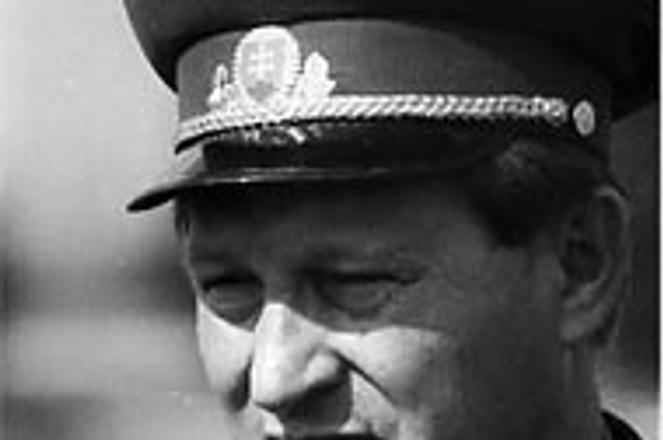Chairman of the Joint Chiefs of Staff Jozef Tuchyňa said the military is ready, but the country still needs "correct political will."Vladimír Hák
Washington's icy reception of Slovak Foreign Minister Pavol Hamžík's visit there last month has fuelled already existing doubts that the country's bid for NATO membership will pay off at the alliance's July summit in Madrid.
Meeting with Hamžík on April 23, US Secretary of State Madeleine Albright once more told him that Slovakia must continue making democratic progress before joining NATO. "We are disappointed with Slovakia because it did not carry out the type of economic and political reform which we all expected," the U.S. State Department quoted her as saying during Hamžík's visit.
State Department spokesman Nicholas Burns urged the Slovak government "to take concrete steps to pass a minority language law, and give opposition members greater representation in intelligence, media, and privatization committees."
While Hamžík and Albright pledged to "strengthen relations and cooperation" in future talks on the issue, the meeting's nasty aftertaste was evident in an indignant interview Hamžík gave to The Washington Times. "In my opinion, this is going too far," Hamžík said of Burns's statement, adding "If I had known they were going to tell me this, I wouldn't have come."
"It is a real joke to invite Hungary [to join NATO] and not to invite Slovakia," Hamžík continued. Asked if he thought Albright understood the political situation in Slovakia, Hamžík answered, "not really," adding, "On the issue of respecting human rights, the situation in Slovakia is better than in many Western countries. There is no xenophobia, no racism [in Slovakia]. I am disappointed by the State Department's statement."
His superior, Prime Minister Vladimír Mečiar, lashed out at the US for its "negative attitude" toward Slovakia's admission efforts. "With regard to the US's negative attitude, it makes it very unlikely that Slovakia will be in the first wave of NATO applicants," Mečiar told a joint news conference with visiting Russian Prime Minister Viktor Chernomyrdin.
Military shines
While some Western countries' perception of Slovakia's political culture continues to dog its chances of entering NATO, military officials say they have no doubt that the country is militarily capable of integrating into the alliance. "The army has done a great deal of work that cannot be ignored," said General Jozef Tuchyňa, chairman of the Slovak joint chiefs of staff, the council with the commanders of the country's armed forces. "Our people are being prepared. The process of NATO enlargement cannot be stopped. All we need is correct political will."
That preparedness and Slovakia's geopolitical position on the European map in Tuchyňa's mind makes it inevitable that NATO almost cannot help but take it. "In any case, the Slovak Republic will stay in the heart of Europe," Tuchyňa said. "It has its neighbors, cooperates in the OSCE [Organization for Cooperation and Security in Europe], and participates in the Partnership for Peace, which is not over yet. From this point of view, the integration process cannot be stopped."
"The efficiency of the Slovak Army is roughly the same as NATO's," Tuchyňa continued. "Compatibility should be viewed according to [our] ability to undertake common operations, coordination of communication and command [structures], opportunities for our officers to work at different levels of command, and introducing identical means of communication. In the first place, it requires people with foreign language skills. We have made marked progress in that sphere. In my opinion, it is the main step to achieving interoperability."
Pavol Hrivík, foreign affairs advisor to Defense Minister Ján Sitek, said Slovakia's participation in NATO's Planning and Review Program (PARP) and United Nations peace-keeping missions in Bosnia and eastern Slavonia demonstrate the seriousness of Slovakia's commitment. "We fulfilled all our objectives in interoperability of communications, identification and navigation systems, logistical support, and in ground maneuvers and air operations" in the program's first phase, Hrivík explained. "Now we have proposed improving and enlarging [our] interoperability with about twenty additional objectives, but this is still under discussion, and will be finished during the next two months at the expert level."
The human dimension
An American expert on NATO enlargement agreed with the Slovak sources that the country's main obstacle to joining the alliance is not the army's lack of readiness. "The degree of military prestige in [Slovak] society is an enormously positive attribute," said Donald Abenheim, a visiting professor and NATO scholar at the California-based Hoover Institute. "Compared to other countries, the quality of officers, career soldiers and civilians [in Slovakia] is very high. They're clearly committed to integration."
"NATO's about mutual cooperation and the role of democracy in the making of broader membership structures," Abenheim continued. "Everybody talks about the hardware, but what counts is the human dimension."
Abenheim argued that Slovakia should not be deterred from joining NATO down the road even if the country is excluded from the first pick this summer. "I would in no way say there's no chance of getting in down the road," he said. "They would of course have to try harder [for admission, but] again, the most important thing are the imponderables: political will, bureaucratic skill, inter-agency cooperation, a balance between the executive and legislative branches, and reflection of popular will in military decision-making."


